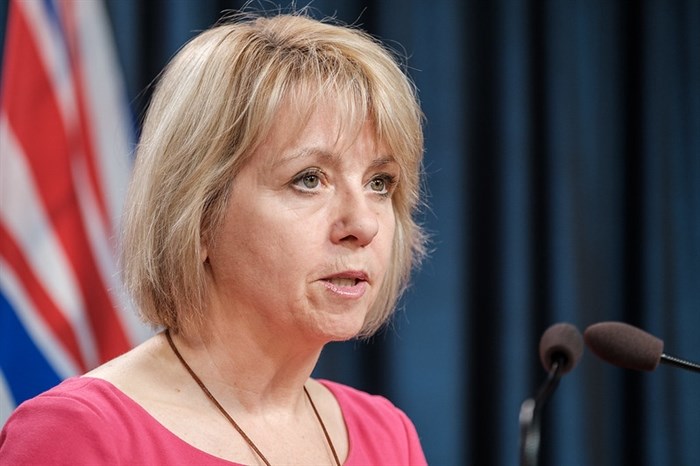
B.C.'s provincial health officer Dr. Bonnie Henry is seen answering reporters questions during a COVID-19 briefing on May 5, 2020.
Image Credit: SUBMITTED / Province of B.C.
May 28, 2020 - 5:21 PM
B.C.’s provincial health officer will continue to lobby for the decriminalization of illicit drugs, as the impact of COVID-19 seemingly puts upward pressure on the number of overdose deaths.
There were 117 overdose deaths in B.C. this April which Dr. Bonnie Henry said is a “notable and disheartening” increase.
“These are our family. These are our community members. They're mostly our sons. Our nephews, our cousins, our brothers and sisters,” she said. “Most of them are between the ages of 20 and 50. So these are young people, these are young men, more than women in our society.”
The data indicates that most of these young, drug-using men are dying alone in their homes, said Dr. Henry.
“We know there's a stigma associated with people who use drugs, and that is one of the things that we need to overcome,” she said.
“We also know, for those who are facing things like homelessness and mental health and substance use disorders, COVID-19 and all have the measures that we've had in place to stop this virus is an added challenge.”
Drug toxicity has increased, said Dr. Henry, in part, due to the supply chains being cut off.
“Drugs are then being either manufactured locally or cut with other materials that are toxic as well… that has quite a bit to do with the numbers that we're seeing,” she said.
She said that COVID-19 has also put more money into the pockets of people who are in a difficult position, and people who are dealing with drugs or are taking advantage of people who are in that position.
Also, COVID-19 is creating more challenges for health care providers to offer services particularly to people who use drugs who are homeless or under-housed and reducing access to overdose prevention sites.
“We’ve had to change those models and we've seen the same here in Victoria and in Vancouver as well, and certainly in the Interior,” she said.
That raises the question of how to switch over to being able to support people who use drugs through a virtual means.
“That's been a challenge for many people, particularly if they don't have access to the internet for example,” she said.
Henry said she’s turning her attention to a number of initiatives, like increased access to pharmaceutical alternatives, and pushing for the decriminalization of people who have possession of small amounts of drugs for their own use.
“(It’s) a way to try and reduce those barriers, so people who are using at home… are able to reach out to family and friends,” she said.
To contact a reporter for this story, email Kathy Michaels or call 250-718-0428 or email the editor. You can also submit photos, videos or news tips to the newsroom and be entered to win a monthly prize draw.
We welcome your comments and opinions on our stories but play nice. We won't censor or delete comments unless they contain off-topic statements or links, unnecessary vulgarity, false facts, spam or obviously fake profiles. If you have any concerns about what you see in comments, email the editor in the link above.
News from © iNFOnews, 2020